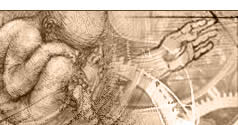 |
 |
 |
 |
 |
 |
 |
 |
|
 |
 |
 |
92 Human consciousness
|
| Menu | back |
So-called near-death experiences suggest that human consciousness can exist separately from the body. It is true that even consistent first-hand reports by people who were clinically dead for brief periods cannot provide absolute certainty, because human consciousness is a phenomenon that cannot be definitively defined, either in medical or philosophical terms. But each person can make his or her own decision to answer the question: Is your consciousness the product of an essentially dead mechanism, or is it a part of your original "self" that exists independently of your physical body?
Consciousness is understood to be the ability to have thoughts, emotions, perceptions and memories and to be aware of them, experience them, be conscious of them. The phenomenon of consciousness is often considered one of the biggest unsolved problems of philosophy and natural science. There is currently no precise and generally recognized definition of consciousness.
The actual puzzle presented by consciousness can be expressed by the question of how it can be possible in principle that the specific arrangement of molecules and dynamics in the active brain results in the actual awareness that is consciousness. The question is not so much how our brain processes the signals from the nerve cells and how we react to this, but rather where does this awareness end? Who or what is, in the final analysis, the recipient of the content of the experiences presented by the brain? Who am "I" that I experience and live all of this? Does a human being have a supernatural spirit and does this spirit continue to exist in some form of consciousness when physical brain activity stops?
The puzzling nature of the phenomenon of consciousness has two different aspects:
For one thing, states of consciousness have an experiential content, and it is not clear how the brain can produce experience, nor is it clear who or what it is, in the final analysis, that takes in this experience and actually experiences it. This is the so-called qualia problem (1).
The other aspect is that thoughts not only refer to objects, but to empirical contents as well. The imagination imagines something, judgement recognizes or rejects something, love loves, hate hates, and desire desires something. The thought that there is still some milk in the refrigerator refers to the objects refrigerator and milk and to the factual content that there is still milk in the refrigerator. It is a complete mystery how the brain can produce thoughts with such properties and who or what finally takes in this content and realizes it in the truest sense. This is the so-called intentionality problem.
I can explain my body and my brain, but there is more. I cannot explain my own existence, said Australian brain researcher and Nobel Prize winner John C. Eccles. Eccles sought for answers to, among other things, the question of how nerve cells conduct stimuli and make major contributions to understanding the processes at work in the human brain.
Eccles also addressed the problem of consciousness in philosophical terms. He himself held the opinion that only humans possess ego consciousness, a feature inherent in a human being from the moment of conception that develops in relationship to the outer world during the first years of life. He rejected strict materialism (the assumption that consciousness could be explained solely on the basis of physical and chemical processes) and compared the brain to a computer and the self to its programmer. He considered that this self (spirit, soul) was supernatural and used the brain as its instrument. For this reason, he thought, we could hope that the self might continue to exist after death (3).
Eccles was known in particular for the 1977 publication of The Self and Its Brain, which was written together with Karl Popper.
These 93 | Menu |
back
|
References:
|
| (1) |
David Chalmers, The Conscious Mind, Oxford University Press, 1996. |
| (2) |
John Searle, Intentionality - An Essay in the Philosophy of Mind, Cambridge University Press, 1983. |
| (3) |
John C. Eccles, factum 5/2001, page 17. | |
| |
Comment this Site!
|
 |
 |
 |
 |
|

